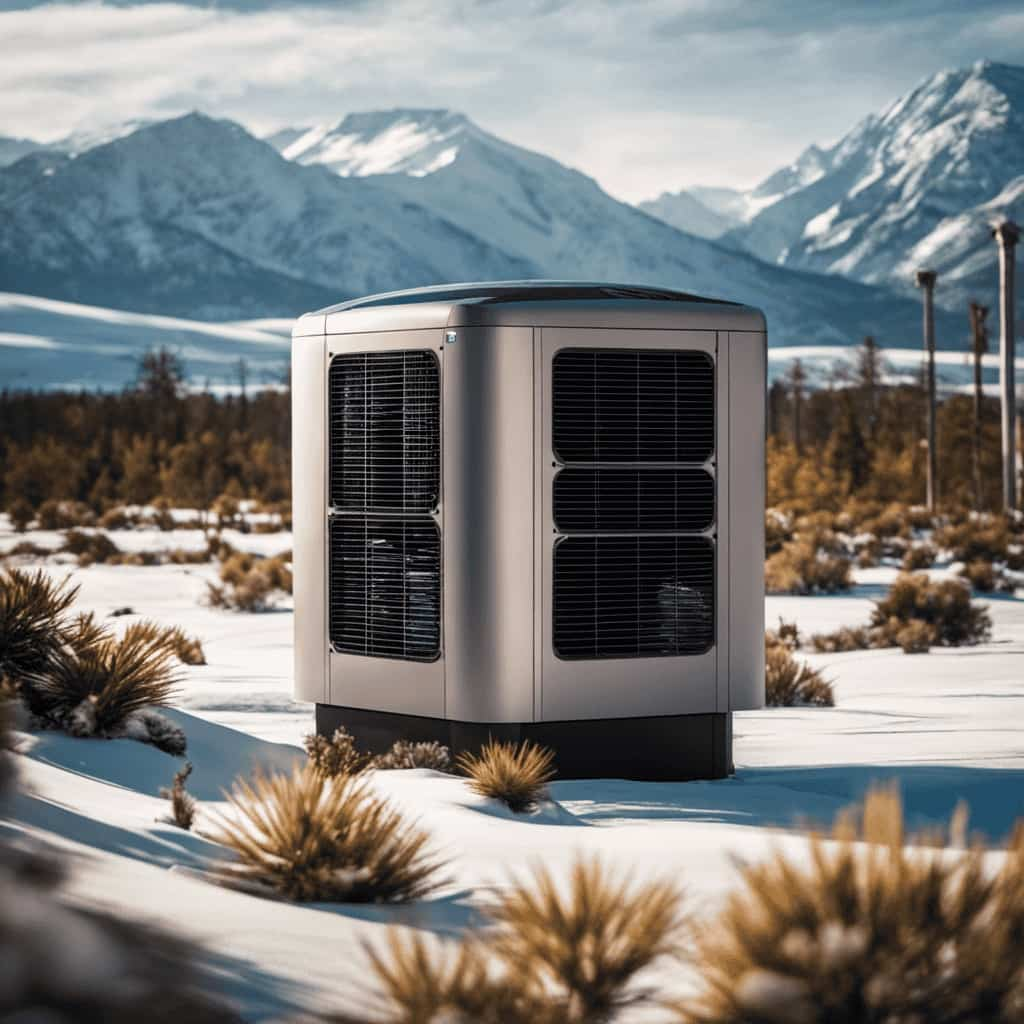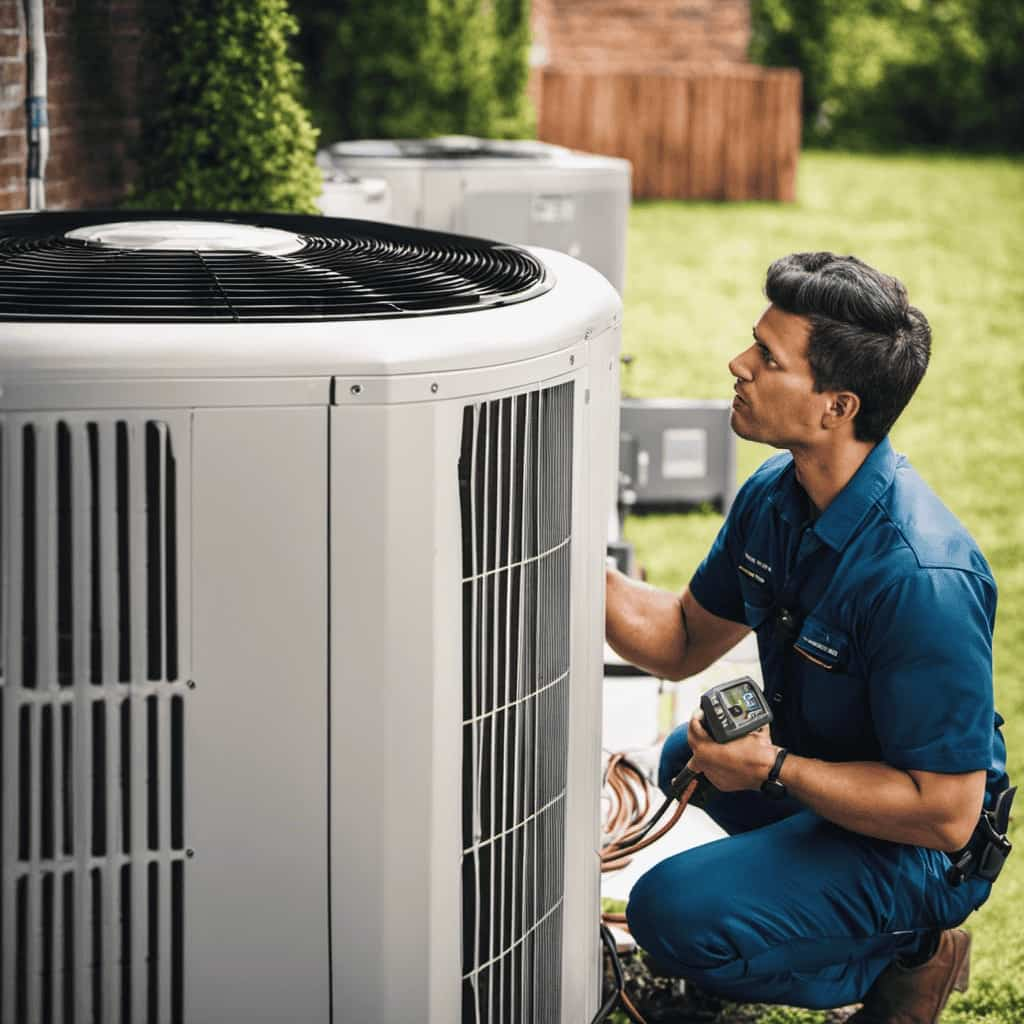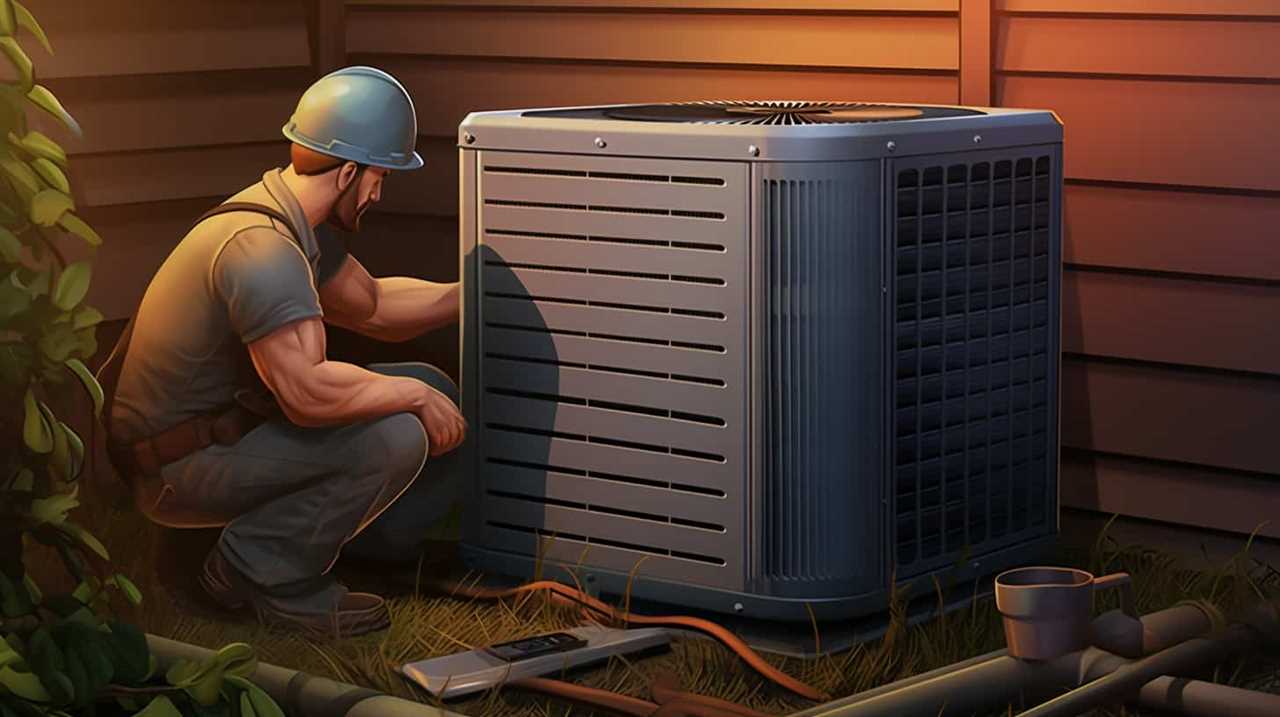Are you sick of paying sky-high energy bills and dealing with ineffective heating and cooling systems? We have the perfect solution for you!
In this guide, we’ll take you through the world of geothermal heat pumps and show you how to compare their efficiency.
With our expert advice, you’ll be able to make an informed decision and find the most cost-effective and energy-efficient option for your home.
Say goodbye to soaring bills and hello to comfort and savings!

Key Takeaways
- Coefficient of Performance (COP) and Energy Efficiency Ratio (EER) are important efficiency ratings to consider when evaluating geothermal heat pumps.
- Factors such as system size and design, ground temperature, and heat transfer characteristics can affect the efficiency of geothermal heat pumps.
- Geothermal heat pumps may have higher installation costs initially, but they offer long-term savings on utility bills.
- Understanding and evaluating the performance coefficient (COP) and seasonal energy efficiency ratio (SEER) helps homeowners make informed decisions about geothermal heat pumps.
Understanding Geothermal Heat Pump Efficiency Ratings
We will now explore the different efficiency ratings that are used to measure the performance of geothermal heat pumps.
When it comes to geothermal heat pump installation and maintenance, understanding efficiency ratings is crucial. These ratings provide valuable information about the energy efficiency and performance of the system.
The most common efficiency rating for geothermal heat pumps is the Coefficient of Performance (COP). This rating measures the amount of heat energy produced by the system in relation to the amount of electrical energy consumed.
Another important rating is the Energy Efficiency Ratio (EER), which indicates the cooling efficiency of the heat pump.

By understanding these efficiency ratings, homeowners can make informed decisions about their geothermal heat pump systems, ensuring optimal performance and energy savings.
Now, let’s delve into the factors that affect the efficiency of geothermal heat pumps.
Factors Affecting the Efficiency of Geothermal Heat Pumps
To maximize the efficiency of geothermal heat pumps, it’s important to consider factors such as system size and design, ground temperature, and heat transfer characteristics. These factors play a crucial role in optimizing geothermal heat pump performance and ensuring its longevity. Here are four key factors to consider:
-
System size and design:
Proper sizing and design of the geothermal heat pump system are essential for optimal performance. Oversized or undersized systems can lead to inefficiencies and increased energy consumption.
-
Ground temperature:
The temperature of the ground where the geothermal heat pump is installed affects its efficiency. A consistent ground temperature allows the system to operate more efficiently, reducing the need for additional energy. -
Heat transfer characteristics:
The efficiency of heat transfer between the geothermal heat pump and the surrounding ground or water sources impacts its overall performance. Proper heat transfer ensures that the system can effectively extract and distribute heat. -
Geothermal heat pump maintenance:
Regular maintenance is crucial to keep the system running efficiently. This includes cleaning or replacing filters, inspecting and repairing any leaks, and ensuring proper refrigerant levels.
Comparing Energy Efficiency of Ground Source Heat Pumps
When comparing the energy efficiency of ground source heat pumps, it’s important to consider factors such as the coefficient of performance (COP) and the seasonal energy efficiency ratio (SEER).

The COP measures the ratio of heat output to the amount of electricity input, indicating how efficiently the heat pump converts energy. A higher COP signifies greater efficiency.
The SEER, on the other hand, measures the cooling output of the heat pump over a cooling season divided by the total energy input during that period. It’s crucial to compare these values when evaluating the energy efficiency of different ground source heat pumps.
Additionally, it’s worth noting that geothermal heat pump installation costs may initially be higher compared to traditional heating systems, but the long-term energy savings can outweigh this initial investment.
Analyzing Performance Coefficient (COP) in Geothermal Heat Pump Systems
Analyzing the performance coefficient (COP) in geothermal heat pump systems reveals the efficiency of heat conversion in relation to electricity consumption. Here are four important points to consider when evaluating the COP of a geothermal heat pump system:

-
COP Calculation: The COP is determined by dividing the heat output by the electrical energy input. A higher COP indicates greater efficiency, as it means more heat is produced for a given amount of electricity consumed.
-
Cost Comparison: When comparing geothermal heat pumps, it’s essential to consider the cost of installation and operation. While geothermal systems have higher upfront costs compared to traditional heating and cooling systems, their energy efficiency can lead to significant long-term savings on utility bills.
-
Installation Process: Installing a geothermal heat pump requires expertise and specialized equipment. A professional technician will assess the site, determine the best system size, and install the ground loop system. It’s crucial to choose a reputable installer with experience in geothermal systems.
-
Maintenance: Regular maintenance is necessary to ensure optimal performance and longevity of a geothermal heat pump system. This includes checking the refrigerant levels, cleaning the filters, and inspecting the ground loop system for any leaks or damage.

Evaluating the Seasonal Energy Efficiency Ratio (SEER) of Geothermal Heat Pumps
As we evaluate the Seasonal Energy Efficiency Ratio (SEER) of geothermal heat pumps, it becomes clear that this metric is crucial in determining the overall energy efficiency of the system. The SEER is a measure of the cooling output of the heat pump during a typical cooling season divided by the electric energy input. It takes into account the heat pump’s efficiency at different outdoor temperatures and the hours of operation during a season. By evaluating the SEER, we can determine how efficiently the geothermal heat pump will cool a space and how much energy it will consume in the process. This evaluation is important for individuals who desire serving others by providing them with energy-efficient and cost-effective cooling solutions. To evaluate the SEER, various methods can be employed, including heat transfer analysis and performance testing. These evaluation methods help determine the SEER rating of a geothermal heat pump and ensure that it meets or exceeds industry standards.
| SEER Rating | Cooling Output (BTU/h) | Energy Input (kWh) |
|---|---|---|
| 16 | 36,000 | 2,250 |
| 20 | 45,000 | 2,250 |
| 24 | 54,000 | 2,250 |
Frequently Asked Questions
What Is the Average Cost of Installing a Geothermal Heat Pump System?
The average cost of installing a geothermal heat pump system can vary depending on factors such as location and system size. However, considering the long-term energy savings and efficiency, it can be a worthwhile investment.
Are There Any Government Incentives or Tax Credits Available for Installing a Geothermal Heat Pump?
Oh, government incentives and tax credits for installing a geothermal heat pump? You bet there are! We’ve got some sweet deals lined up to help you save some serious cash. Let us break it down for you.
Can a Geothermal Heat Pump System Be Used for Cooling Only, Without the Heating Function?
Yes, a geothermal heat pump system can be used for cooling only. It utilizes the earth’s constant temperature to cool your home efficiently. This can help reduce energy consumption and lower utility bills.

How Long Does It Typically Take to Recoup the Initial Investment of a Geothermal Heat Pump System Through Energy Savings?
We found that the payback period of a geothermal heat pump system depends on factors like energy prices and the cost of installation. It typically takes several years to recoup the initial investment through energy savings.
Are There Any Specific Maintenance Requirements for Geothermal Heat Pumps That Homeowners Should Be Aware Of?
There are specific maintenance requirements for geothermal heat pumps that homeowners should be aware of. Regular inspections, filter changes, and system cleanings are necessary to ensure optimal performance and maximize the benefits of geothermal heat pumps.
Conclusion
After comparing the efficiency ratings and performance coefficients of different geothermal heat pumps, it’s clear that investing in a ground source heat pump can greatly benefit both the environment and our wallets.
The high SEER values and low energy consumption of these systems allude to a future where we can enjoy comfortable living spaces while reducing our carbon footprint.

Let’s embrace this technology and make a positive impact on our planet.









